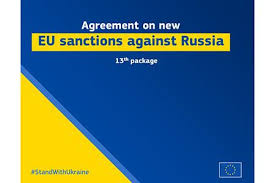EU adopts 13th package of sanctions against Russia after two years of its war of aggression against Ukraine

Brussels: The Commission welcomes the Council’s adoption of a 13th package of sanctions against Russia. Two years since Russia brutally invaded Ukraine, EU’s support for Ukraine and its people remains as strong as ever. Europe is united and determined to continue defending its values and founding principles.
This package focuses on further limiting Russia’s access to military technologies, such as for drones, and on listing additional companies and individuals involved in Russia’s war effort. With this new package the number of individual listings has reached over 2000, dealing a huge blow to those who enable Russia’s illegal war against Ukraine.
Yet, there is no room for complacency. Full implementation of the sanctions is crucial, to deny Moscow the revenue, goods and technology it needs to feed its war. The Commission will continue supporting Member States to ensure effective enforcement of the measures, as well as working closely with third countries to tackle circumvention attempts.
The 13th package has these key elements:
This is an unprecedented package of 194 individual designations, including 106 individuals and 88 entities. With it, the EU exceeds the threshold of 2000 listings. In particular:
Targeting Russia’s military and defence sector: the new listings include more than 140 companies and individuals from the Russian military-industrial complex, which among other things manufacture missiles, drones, anti-aircraft missile system, military vehicles, high-tech components for weapons, and other military equipment.
Sending a strong signal against Russia’s war effort partners: the new listings target 10 Russian companies and individuals involved in the shipping of Democratic People’s Republic of Korea (DPRK) armaments to Russia. They also target the Defence Minister of the DPRK, as well as several Belarusian companies and individuals providing support to the Russian armed forces.
Fighting circumvention: the new listings include a Russian logistics company and its director involved in parallel imports of prohibited goods to Russia, and a third Russian actor involved in another procurement scheme.
Strengthening EU action against Russia’s temporary occupation and illegal annexation of areas of Ukraine: the new listings include six judges and 10 officials in the occupied territories of Ukraine.
Sanctioning violations of children rights: The new listings also include 15 individuals and 2 entities involved in the forced transfer and in the deportation and the military indoctrination of Ukrainian children, including in Belarus.
This package further deepens our actions to stop Russia from acquiring Western sensitive technologies for Russian military. Unmanned aerial vehicles, or drones, have been central to Russia’s war against Ukraine. This package thus specifically lists companies procuring Russia with key drone components and introduces some sectoral sanctions to close loopholes and make drone warfare more complicated.
BaSed on hard evidence from various sources, supported by trade and customs data, the package adds 27 Russian and third country companies to the list of entities associated to Russia’s military-industrial complex (Annex IV of Regulation 833/2014). The EU will impose export restrictions towards these companies regarding dual-use goods and technology, as well as goods and technology which might contribute to the technological enhancement of Russia’s defence and security sector. The package adds:
17 Russian companies which are involved in the development, production and supply of electronic components, particularly used in connection with drone production.
Four companies registered in China and one each registered in Kazakhstan, India, Serbia, Thailand, Sri Lanka, and Türkiye, also trading in the area of electronic components, including of EU-origin.
In addition, the package expands the list of advanced technology items that may contribute to Russia’s military and technological enhancement or to the development of its defence and security sector. It adds components used for the development and production of drones, such as electric transformers, static converters and inductors found inter alia in drones, as well as aluminium capacitors, which have military applications, such as in missiles and drones and in communication systems for aircrafts and vessels. This will further weaken Russia’s military capabilities.
The new package adds the United Kingdom to the list of partner countries for the iron and steel imports. These partner countries apply a set of restrictive measures on imports of iron and steel and a set of import control measures that are substantially equivalent to those in the EU Regulation (EU) No 833/2014.





